Communication is simply an exchange of information where the messages are conveyed, received, and understood by both parties. From this perspective, it looks relatively easy, right?
Despite that, misunderstandings, disputes, and confusion are common— and construction sites are far from the exception.
This is because companies often lack the necessary methods and tools to communicate effectively.
What’s more, even some Fortune 500 companies have experienced significant losses due to poor communication. We’re talking about billions of dollars worth of damage.
So, it’s clear that good communication is a necessary soft skill that improves teamwork and project collaboration. But how do you improve it?
That’s why we’ve compiled this list of top tips you can try to create more effective communication in your company and worksite.
Let’s start!
In this article...
Establish the Right Communication Methods
Sending a daily report in an email a supervisor rarely uses might mean important information doesn’t get seen on time, yet sometimes telling other people about essential change orders can’t be done over a phone call—instead, it requires a face-to-face meeting.
However, determining the most efficient means of communication is essential for the success of your project.
What can you do?
First, it’s important that you have a formal method of communication set from the start.
This means that workers on the field and in the office can reach relevant decision-makers and gather information quickly through an approved channel.

Keeping everyone informed is necessary, so if you stick to one method of communication, it’s easier to prevent information loss or miscommunication.
Following that, in a recent informal survey conducted on Reddit, it’s clear that contractors and workers have certain preferred methods for communication.
They typically favor texting, phone calls, and email, which makes choosing your go-to communication method much easier.
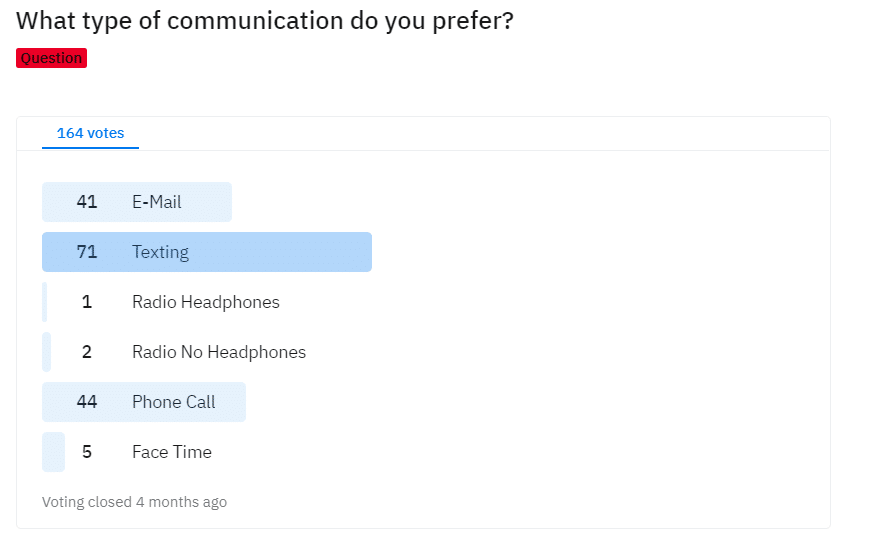
You don’t have to reinvent the wheel, just lean into practices your workers are familiar with and use often. That way, you can be confident that the correct information will reach them on time.
Yet, you still have to keep in mind to adjust the communication method for each project and worker profiles.
It’s fairly easy to set up email communication when working in an urban area with a good Internet connection, but keeping everyone informed this way can be tricky when you’re in remote areas.
In those circumstances, you might use two-way radios.
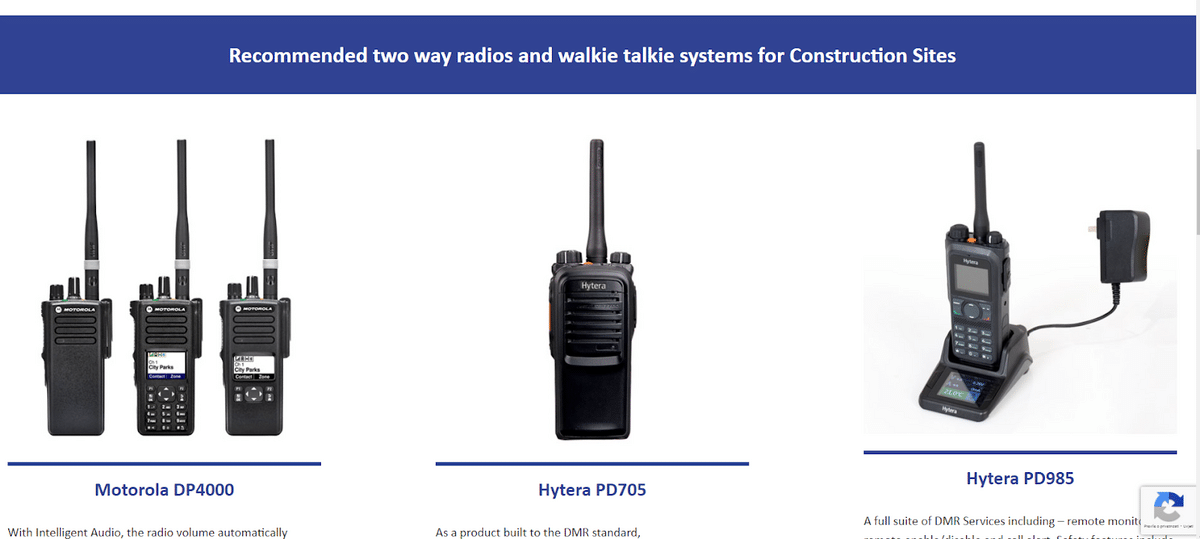
Choosing the right communication method is crucial for creating efficient and productive worksites.
Getting the information and data on time can mean a difference between a successful project completion or additional delays.
Now, another thing to keep in mind is standardizing the hours in which you will respond to texts, emails, and phone calls.
If you ask contractors, there’s a split between sticking to a schedule (i.e. limiting business communication to business hours) and being available 24/7.
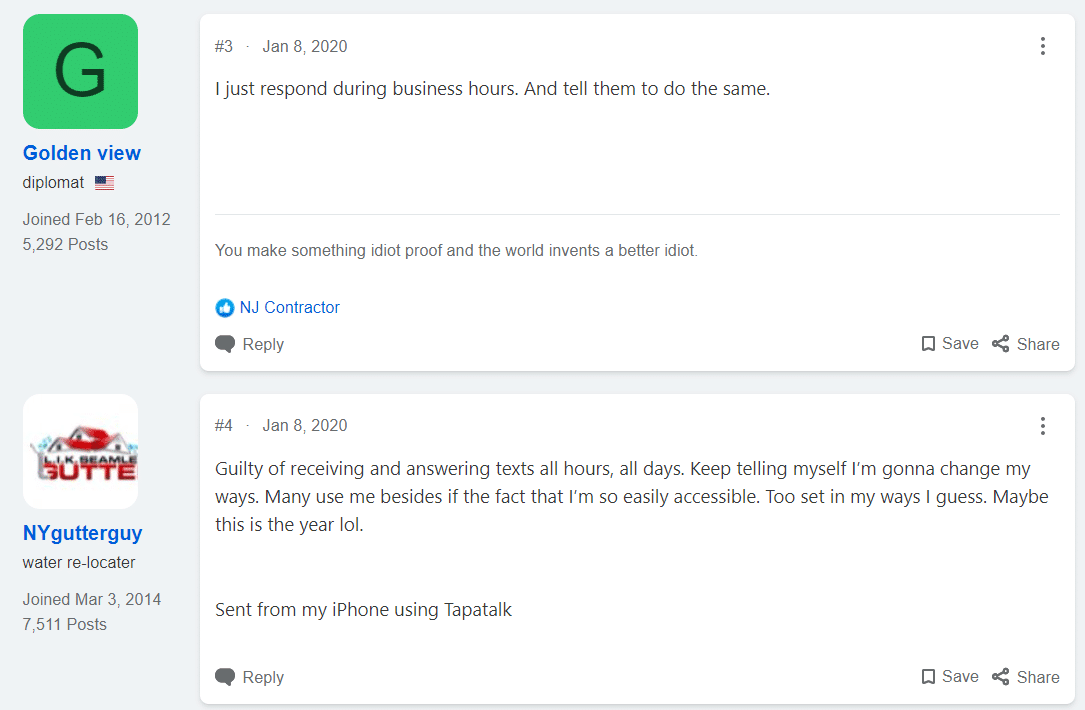
Obviously, each project is different, and sometimes, you’ll need a more hands-on approach where you’ll answer emails late at night.
But just like with choosing the suitable method, you must establish communication hours for your employees as well.
Tell them when you’ll be available to communicate project-related issues and stick to it.
With properly set up communication channels, it shouldn’t be a problem to finish projects on time and within budget but also have a work-life balance.
In the end, choosing the right communication method can do wonders in improving communication in construction.
But you have to set it right at the beginning of every project you undertake.
Leverage Software for Successful Communication
Obviously, not every piece of information needs to be communicated directly.
You can have a single source of truth that will store important project-related information that anyone can access, and work with relevant and updated data 24/7.
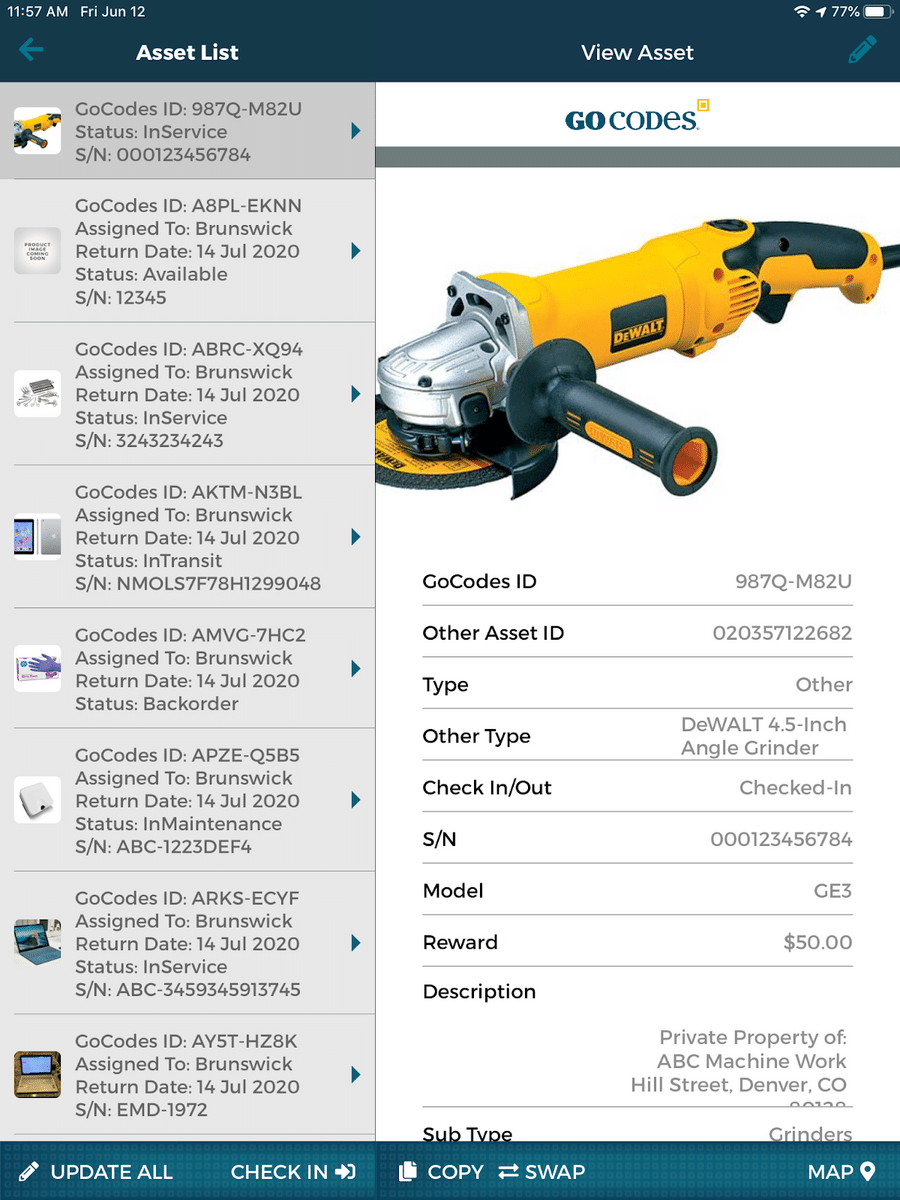
For that, some construction companies use different communication tools and construction software.
Software has the added benefit of allowing them to send daily reports and even supplement those reports with photos more easily. And editing history makes them more accountable.
Even having a dedicated mobile app will make most processes faster and more efficient since they are very user-friendly and convenient.
For example, a subcontractor can easily double-check specs on his mobile app and continue doing work rather than having to call a supervisor and waste time waiting for them to answer.
Here are some top construction software solutions use for successful communication:
Procore | All-in-one cloud-based construction management software that streamlines communication between the office and the field. |
Bridgit | Workforce planning software contractors use for task management, reporting, and note-taking. |
e-Builder | Project management software that helps contractors increase productivity on job sites and have more control over performance. |
GoCodes Asset Tracking | User-friendly solution for asset tracking and controlling inventory levels. |
Red Cross First Aid | Provides videos and instructions which enable users to handle most work-related injuries, like sprains, cuts, and broken bones. |
DroneDeploy | Drones survey sites and gather accurate measurements you can share with other stakeholders. |
Autodesk BIM 360 | A project management tool that covers many aspects of construction projects, from scheduling to quality management and constructability. |
Buildertrend | Another all-in-one construction management software solution that covers financial and customer management but also scheduling and reporting. |
Removing information silos is crucial for improving communication.
Therefore, investing in the right construction software is one of the best ways to share access to critical information while having the most control over your construction projects.
Communicate Information Clearly
Do you know what ‘’pickled finish’’ means? Or what is a ‘’euro hinge’’ or a ‘’cornice’’? Even if you’re familiar with these terms, chances are not everyone you work with understands them.
Using jargon might be helpful when communicating with people from the same sector (e.g., plumber to plumber), but speaking clearly is crucial when you need to convey a message company-wide or to another department.

Using easy-to-understand words is necessary to ensure workers receive the information and continue their work as intended.
Additionally, you can also ask them to repeat the information back to you to confirm they listened and understood everything.
Otherwise, you might find yourself in a situation similar to this contractor. Even if you’re not using jargon, people can easily misunderstand and make silly mistakes in the short term.
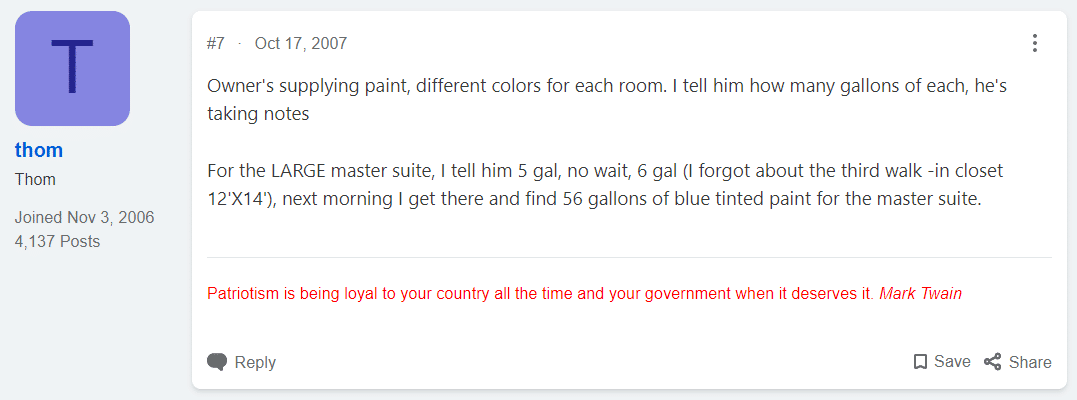
Now, even though this story is amusing, the reality is that poor communication can have terrible consequences for construction companies.
In a recent survey conducted by Dynamic Signal, 52% of employees reported that ineffective communication resulted in lost sales and damaged company reputation.
Therefore, good communication is more valuable than people think. So what can you do?
In a nutshell, good communication means avoiding confusion, so be clear and concise in your oral and written messages.
Keep them brief, simple, and to the point, so you give out only the necessary information. At the same time, you should also give enough detail, so people know what they need to do.
Good communication takes practice, so don’t be afraid to reread and rewrite your messages several times. You can also take advice from this contractor on Reddit.
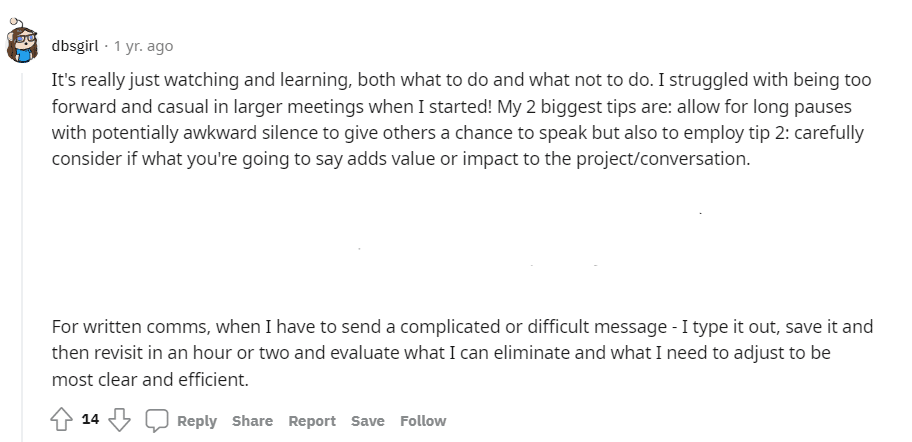
Give yourself time to think about what you’re going to say and focus on the task at hand. Don’t add more information than needed and stay on topic.
As the contractor pointed out, only say things that add value to the conversation and the project’s progress.
Remember that not everyone has specific knowledge in technical areas, so good communication has to be clear, concise, and jargon-free.
Practice Active Listening
Has this ever happened to you?
You’re talking to someone, but they’re looking at the floor, playing on their phone, or interrupting you.
This is an obvious example of an awful conversation that results in poor communication. Yet even if you think someone is listening to you, they might only do it passively.
People can look you in the eye and nod at your words but not really listen to what you’re saying.
They’re not invested in the conversation and spend most of their time thinking about how they’ll respond.
In contrast, a far better communication method is active listening.
Indeed.com defines active listening as an act of complete focus on the speaker, understanding their message, and responding appropriately.
Unlike passive listening, this communication skill keeps people engaged in the conversation and helps them recall important information later.
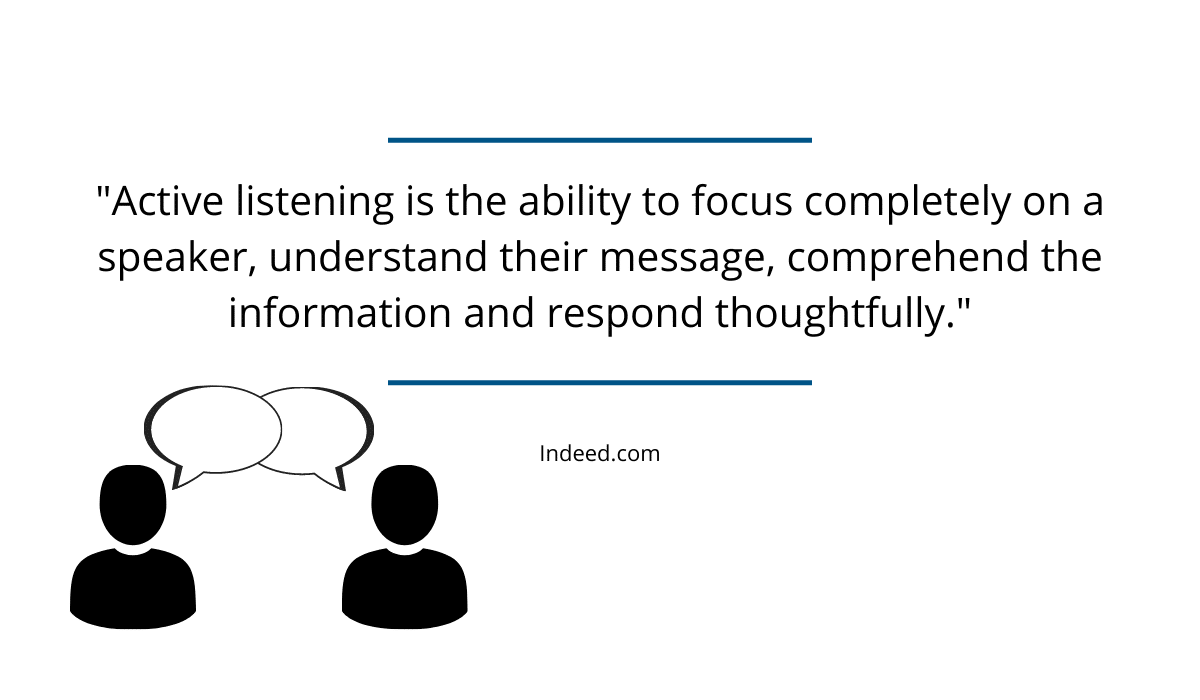
What’s more, active listeners show verbal and non-verbal clues to convey that the speaker has their full attention.
Here is what you can do to become an active listener:
- Avoid distractions and noisy environments.
- Show through body language you are relaxed and attentive.
- Make eye contact and smile.
- Ask meaningful questions to prompt new lines of thought.
- Paraphrase what’s being said with phrases like ‘’So, you’re saying…” or “I’m hearing…”.
- Don’t interrupt with counter-arguments.
Every time you engage in a conversation, strive to be an active listener.
This significantly improves communication on construction sites, but most importantly, it shows respect to the person who is talking.
Listening and trying to understand what’s being said can result in a happier and more productive workforce.
Moreover, this workforce is more likely to do their jobs correctly and efficiently if they understand their assignments from the start, so expensive delays and rework will be minimized.
In the end, active listening is a key element of good communication in construction, so you should practice it every day.
Keep Records of Important Information
We’ve already mentioned that a single source of truth for finding information is necessary for good communication.
But communication doesn’t end with accessing project-related information.
Employees also need to check documents and policies for project compliance. Some of them include:
- Company policy
- Safety and health regulations
- Equipment manuals
- Process instructions
Keep in mind that you need to optimize access to these documents as well. In most cases, you’ll need to digitalize and upload them to your construction communication platform.
But let’s emphasize why that’s important.
According to the same Dynamic Signal study, employees, on average, lose two hours searching for information.
When you turn that into monetary value, that’s approximately $60 in lost wages per week, which, taken to the industry level, can mean losing trillions of dollars in lost productivity.
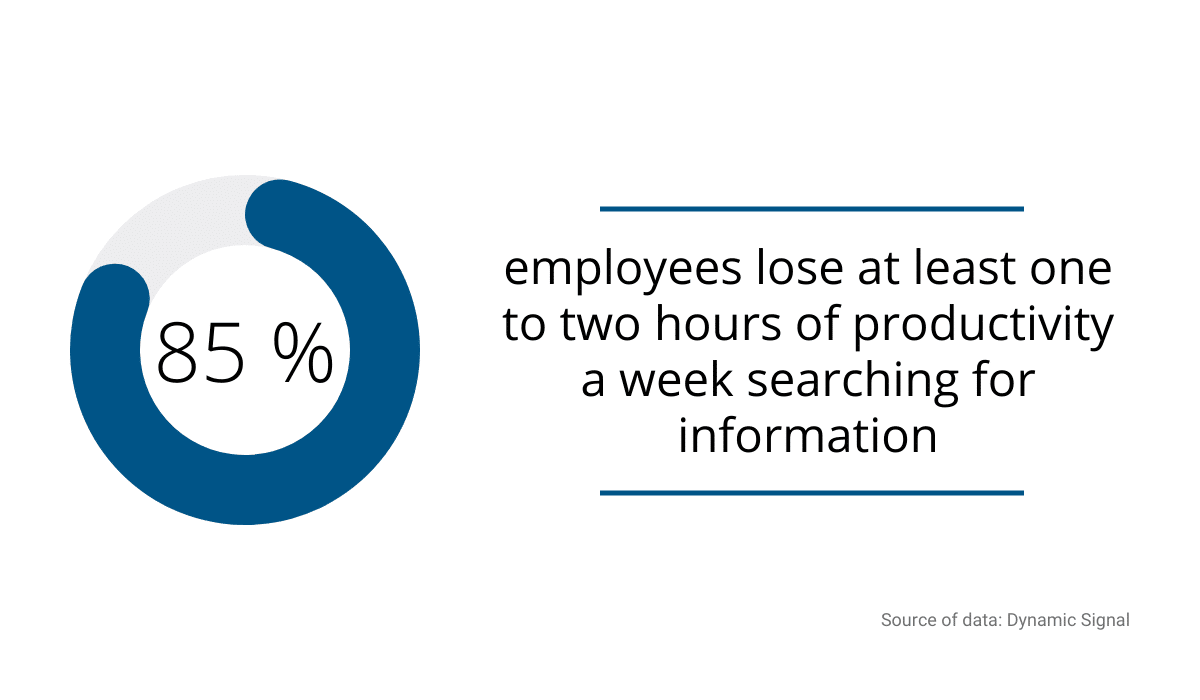
So, apart from using construction software for sending daily reports and asset tracking, it’s also necessary to share access to other useful documents that will enable workers safe and efficient task delivery.
On the other hand, instructions and information are often shared orally in construction.
This can be problematic later on if the stakeholder forgets what they said or insists they said something else.
To combat this problem, one contractor regularly keeps a notebook in their truck and writes down everything related to the project.
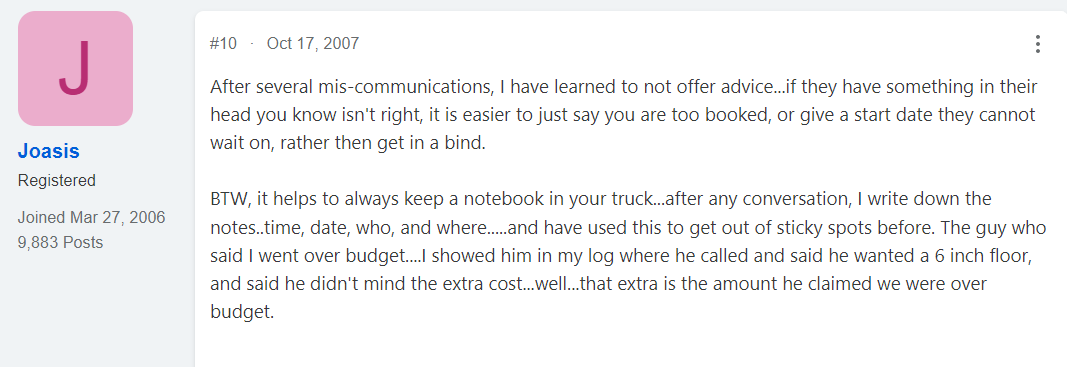
That way, they can remind themselves and the stakeholder of what was said at a specific time and hold them accountable.
There is no confusion, and they can clarify any misunderstandings regarding the project.
All in all, keeping records of important information and documents ensures that everyone finds what they need to do their jobs fast and efficiently.
But also, it saves you frustration and minimizes the ‘’he said, she said’’ situations that lead to disputes.
Conclusion
Good communication is not a talent. It is a skill.
Fortunately, like any skill, it can be improved with continuous practice and the right tools.
When people communicate efficiently, construction projects can run more smoothly, and the working atmosphere is more productive and positive.
Basically, communication in construction is just as important as technical skills in producing a quality project on time and within budget.
So implement some of our tips today to successfully finish construction projects.




